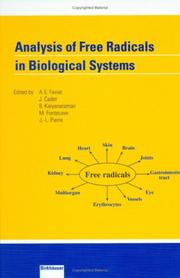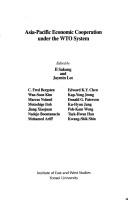| Listing 1 - 10 of 172 | << page >> |
Sort by
|
Book
Year: 1995 Publisher: [Washington, D.C.] : World Bank, Policy Research Dept., Finance and Private Sector Development Division, and Financial Sector Development Dept.,
Abstract | Keywords | Export | Availability | Bookmark
 Loading...
Loading...Choose an application
- Reference Manager
- EndNote
- RefWorks (Direct export to RefWorks)
Book
Year: 1995 Publisher: Cambridge, Mass. National Bureau of Economic Research
Abstract | Keywords | Export | Availability | Bookmark
 Loading...
Loading...Choose an application
- Reference Manager
- EndNote
- RefWorks (Direct export to RefWorks)
Until NAFTA, analyses of preferential trading arrangements began by assuming a customs union with a common external tariff, and the differences between customs unions and free trade agreements (FTAs) have been little analyzed. This paper points to some of the differences between FTAs and customs unions, and shows that on welfare grounds a customs union is always Pareto-superior to an FTA. Moreover, the political economy of FTAs will lead to more opposition to further multilateral trade liberalization than will customs unions.
Book
Year: 1995 Publisher: Cambridge, Mass. National Bureau of Economic Research
Abstract | Keywords | Export | Availability | Bookmark
 Loading...
Loading...Choose an application
- Reference Manager
- EndNote
- RefWorks (Direct export to RefWorks)
In this paper, we derive three lessons from Mexico's experience. First, deep reforms like trade liberalization are not likely to happen by government decree. Instead, they usually come about when the unanimous blocking of reform by powerful elites breaks down. In the case of Mexico, this happened during a fiscal crisis, when some groups tried to displace other groups in order to capture a greater share of fiscal revenue. Second, in the presence of entrenched elites, the sustainability of reform depends on the existence of new groups that benefit from the new status quo and have enough power to defend it. Thus, the speed of successful reform is determined by the speed with which new groups are consolidated. Initially, Mexico limited radical liberalization to the manufacturing sector. The government has only recently begun to undertake serious liberalization in the services and agriculture sectors. The third lesson we take from Mexico is that the importance of formal agreements like NAFTA lies not so much in the ability of these agreements to reduce average import tariffs among their parties and improve their terms of trade vis vis the rest of the world, as claimed by the optimal tariff literature, but in that they serve as commitment devices to force reforms to continue.

ISBN: 3764351373 9783764351373 0817651373 9780817651374 Year: 1995 Publisher: Basel: Birkhäuser,
Abstract | Keywords | Export | Availability | Bookmark
 Loading...
Loading...Choose an application
- Reference Manager
- EndNote
- RefWorks (Direct export to RefWorks)
Free radicals (Chemistry) --- Free radicals (Chemistry) --- Free radicals (Chemistry)

ISBN: 8972250473 9788972250470 Year: 1995 Publisher: Seoul: Institute of East and West Studies, Yonsei University,
Abstract | Keywords | Export | Availability | Bookmark
 Loading...
Loading...Choose an application
- Reference Manager
- EndNote
- RefWorks (Direct export to RefWorks)

ISBN: 0964044730 Year: 1995 Publisher: Fairfax (Va.) : Future of freedom foundation,
Abstract | Keywords | Export | Availability | Bookmark
 Loading...
Loading...Choose an application
- Reference Manager
- EndNote
- RefWorks (Direct export to RefWorks)

ISBN: 9780792331087 0792331087 Year: 1995 Publisher: Dordrecht: Kluwer,
Abstract | Keywords | Export | Availability | Bookmark
 Loading...
Loading...Choose an application
- Reference Manager
- EndNote
- RefWorks (Direct export to RefWorks)

ISBN: 9780121035204 0121035204 9780080534541 0080534546 1281076775 9781281076779 9786611076771 Year: 1995 Publisher: San Diego Academic Press
Abstract | Keywords | Export | Availability | Bookmark
 Loading...
Loading...Choose an application
- Reference Manager
- EndNote
- RefWorks (Direct export to RefWorks)
Free radicals have been implicated in a entire host of different human disease states, which suggests that although they may not have a pivotal causal role, they are involved in the perpetuation of disease. In recent years, it has become evident that although free radicals most certainly do have this role in perpetuating inflammatory reactions, they have perhaps a far more important role in acting as second messenger systems to maintain normal cell function. It is the perturbations of these reactions which pose the most intriguing therapeutic challenges.
Book
ISBN: 1856288455 Year: 1995 Publisher: Aldershot : Avebury,
Abstract | Keywords | Export | Availability | Bookmark
 Loading...
Loading...Choose an application
- Reference Manager
- EndNote
- RefWorks (Direct export to RefWorks)

ISBN: 085092443X 9780850924435 Year: 1995 Publisher: Geneva: International trade centre UNCTAD/WTO,
Abstract | Keywords | Export | Availability | Bookmark
 Loading...
Loading...Choose an application
- Reference Manager
- EndNote
- RefWorks (Direct export to RefWorks)
| Listing 1 - 10 of 172 | << page >> |
Sort by
|

 Search
Search Feedback
Feedback About UniCat
About UniCat  Help
Help News
News